ISSN 2392-1641
e-ISSN 2450-0097
DOI: 10.18559/ebr
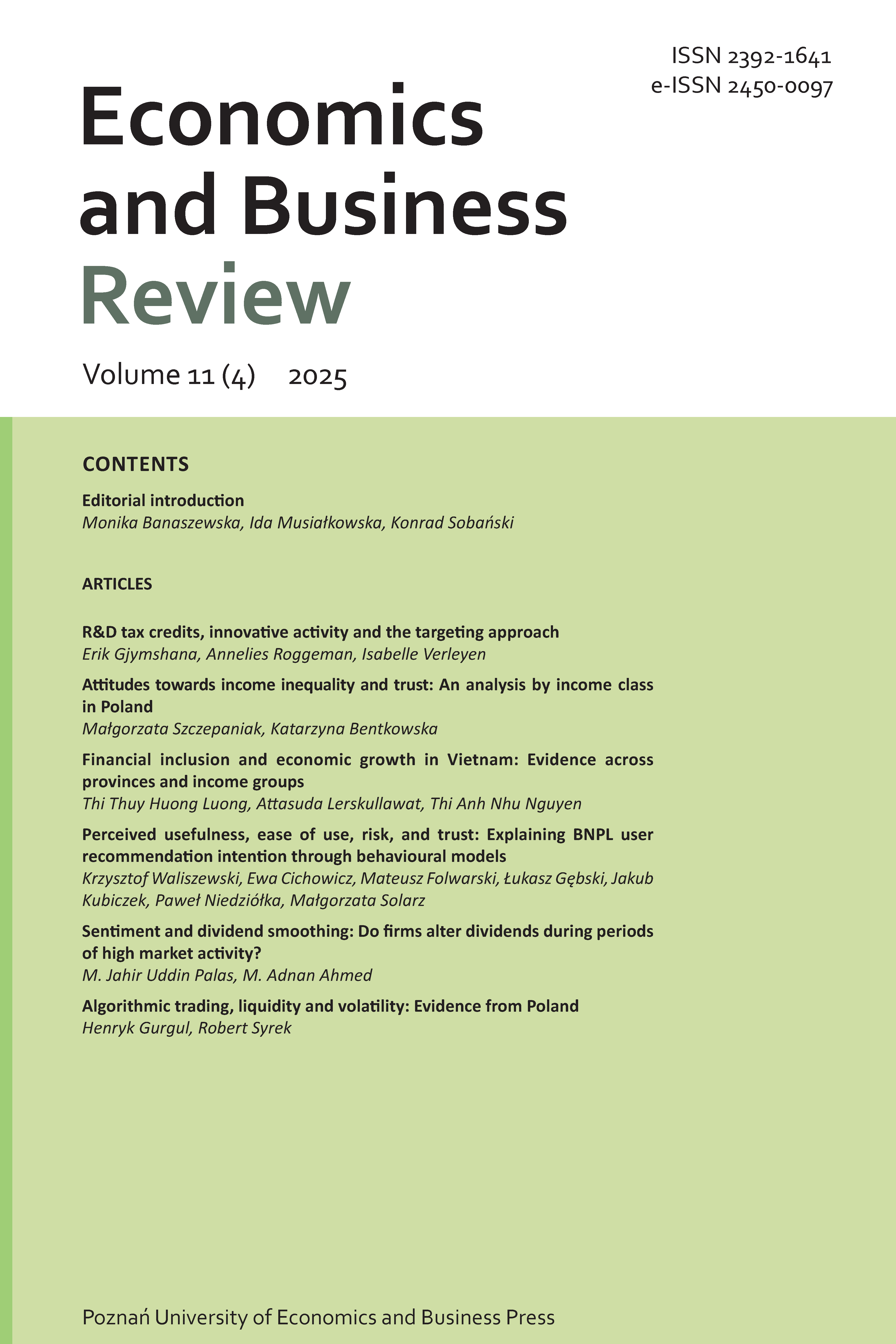
This issue of Economic and Business Review delves into pressing economic and social dynamics shaping innovation, inequality, and financial markets amid global uncertainties. Recent trends, such as rising R&D incentives, post-pandemic widening income disparities highlighted by OECD reports, and the surge in fintech services like Buy Now Pay Later (BNPL), underscore the need for targeted policies. Theories like behavioural finance and trust-based social cohesion frameworks further illuminate how investor sentiment, financial inclusion, and algorithmic trading influence growth and stability.
These six articles written by nineteen scholars from five countries (Bangladesh, Belgium, Poland, Thailand, Vietnam) collectively advance this discourse by blending empirical rigour with policy insights across diverse contexts—from European tax designs to emerging Asian markets. They reveal how incentives drive SME innovation, class-specific attitudes affect trust, and digital tools reshape liquidity and consumer behaviour. (...) (Monika Banaszewska, Ida Musiałkowska, Konrad Sobański)
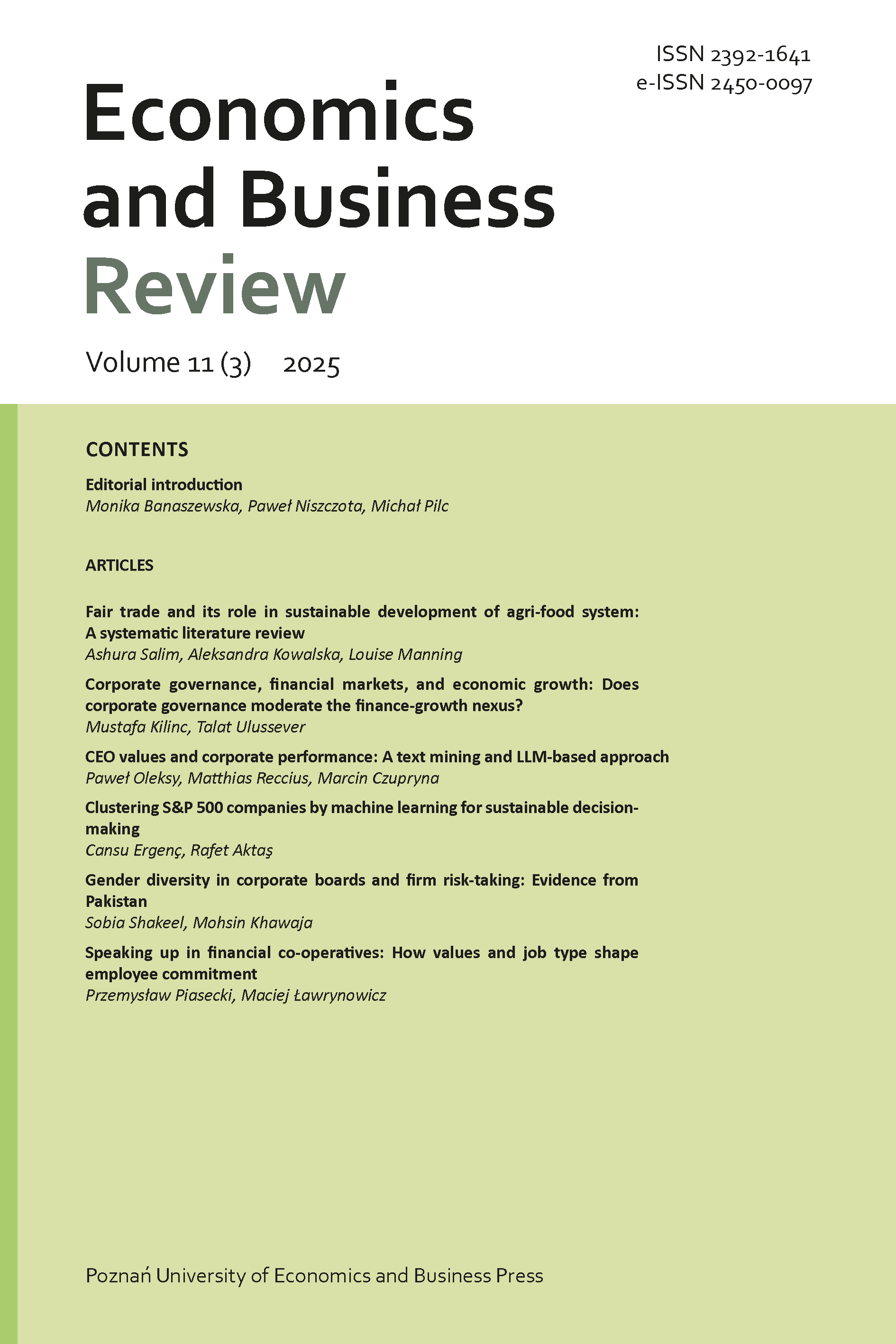
Economic theory is expected to simplify reality in order to identify and analyse the core mechanisms that drive it. In practice, this means that what constitutes a whole field of scientific inquiry for one person can be summarised in a single, simple sentence by an economist. For instance, an economist might say that a CEO is simply an economic agent who maximises income for the shareholders of the company.
The current issue of Economics and Business Review serves as a reminder that this is much easier said than done. This is because this issue focuses strongly on the challenges faced by many CEOs around the world (which turn out to be surprisingly common despite the diversity of countries covered by the six presented studies). Engagement in ESG practices or fair trade, obligations arising from diversity regulations, and managing employee voice and commitment are examples of the complex matters discussed in this issue, all of which must be dealt with by a CEO in order to generate income for shareholders. Moreover, as one of the studies included shows, a useful guide for navigating these challenges is not necessarily economic theory but rather the values that CEOs share and communicate. However, economic theory remains useful for understanding the broader context. For instance, as another article demonstrates, it helps to explain how corporate governance translates into economic growth.(...) (Monika Banaszewska, Paweł Niszczota, Michał Pilc).

Searching for answers to the questions of what and how, analysing phenomena, and verifying theories – these are the ongoing tasks of scientists. The current issue of Economics and Business Review includes five articles. They were written by seven authors, who work in the Czech Republic, Poland, Chad, Spain, and the United Kingdom. The papers delve into finance and economics, building on the formation of expectations, investor sentiment, financial inclusion, economic growth, and game-theory behaviour. Although the articles cover various topics, there is one word that connects them all—information. Historical information, responses to information, access to information, and information processing form the foundations of the papers described below. The editors believe that their practical and theoretical contributions will be of great interest to academics and policymakers (...) (Joanna Lizińska, Katarzyna Schmidt-Jessa, Konrad Sobański).
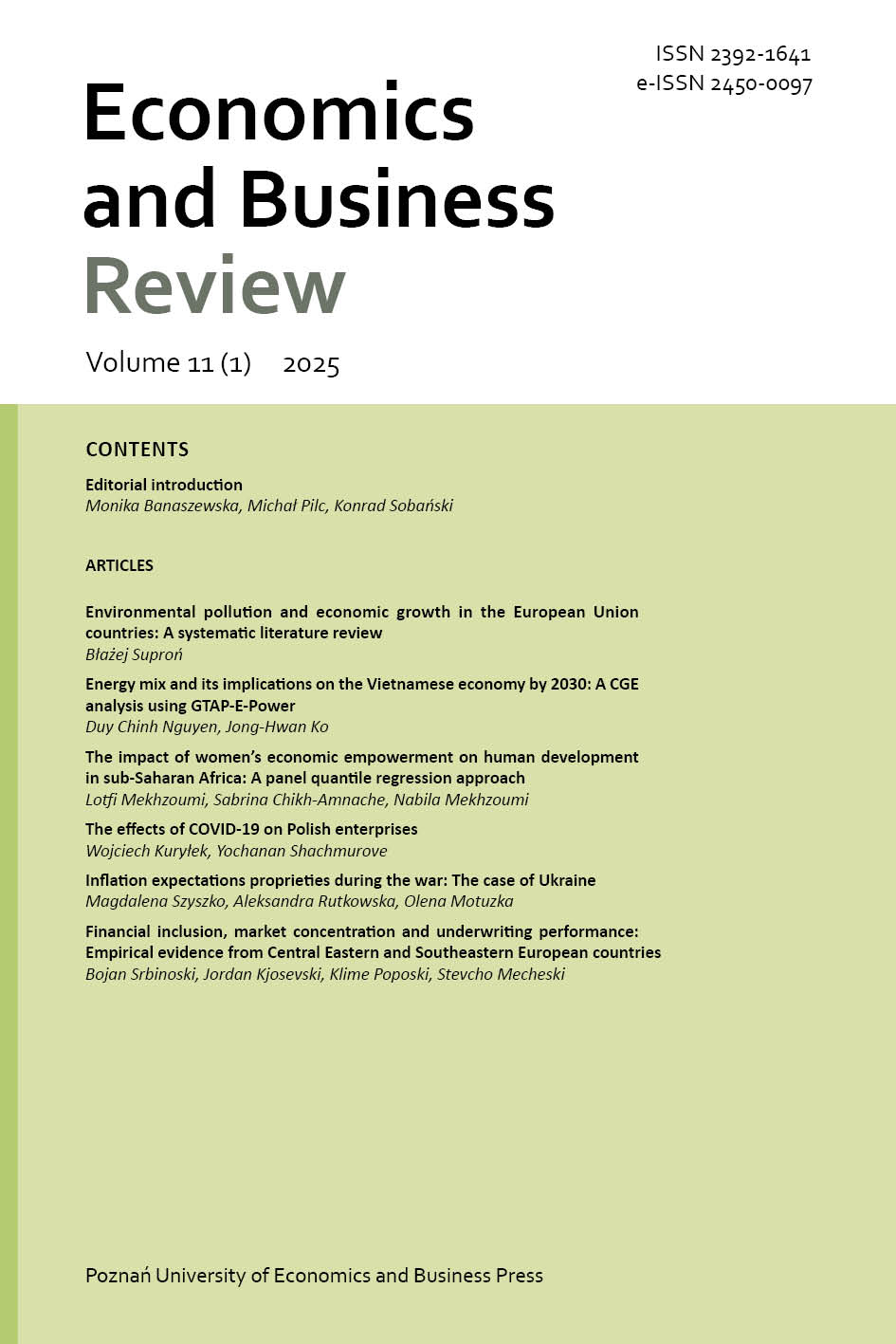
The statement that progress in contemporary economics largely relies on the ability of economists (and their computers) to process various datasets is trivial. This is no surprise, as evolving IT capabilities are continuously transforming the methodological toolkit in almost all scientific disciplines. However, when one examines a particular economic study that pushes the boundaries of what is possible to analyse, it is easy to feel astonished. The journal’s editors hope that at least some of the studies presented in the current issue of Economics and Business Review will serve as such an inspiration. This issue consists of six articles written by fifteen researchers working in Algeria, North Macedonia, Poland, South Korea, Ukraine, and the USA. A systematic review of 1,248 articles, estimates for 150,000 companies, or the application of the dynamic time warping method are among the topics that may captivate the journal’s readers. The editors encourage followers to explore these contributions. (Monika Banaszewska, Michał Pilc, Konrad Sobański)
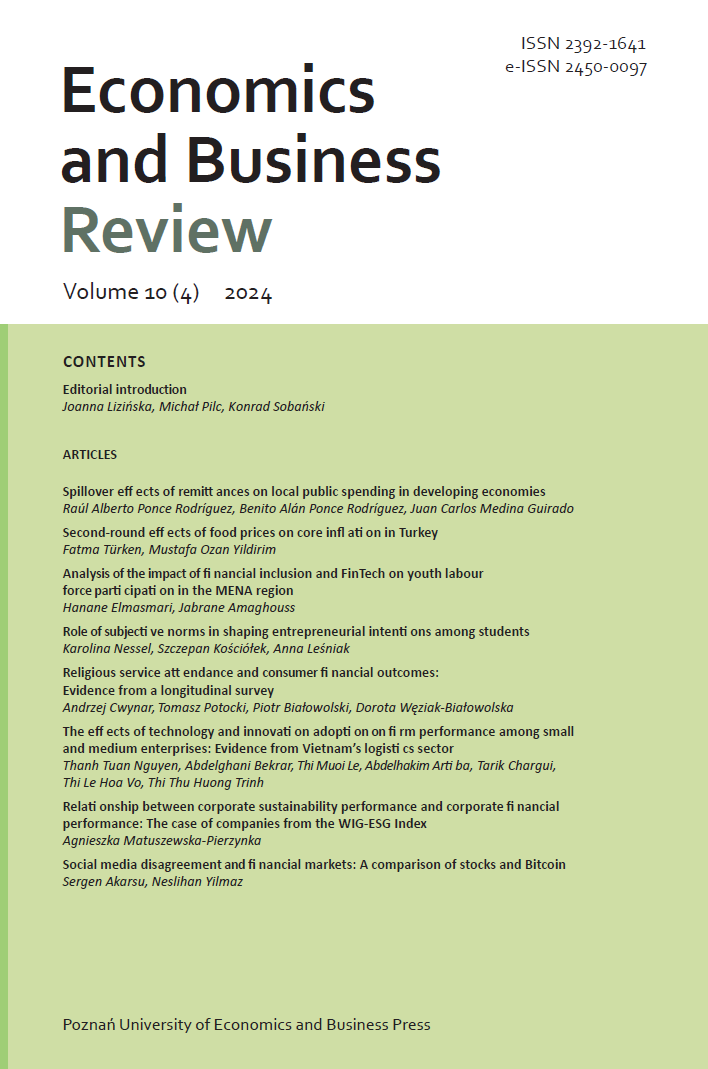
In every developed scientific discipline, scholars tend to focus on narrow, specialist topics and are somewhat confined by the practices in their scientific communities. The impact of such specialisation on the discipline’s development is ambiguous. On the one hand, it helps to refine existing evidence; on the other, it risks overlooking potentially relevant mechanisms or perspectives developed by other scientists. This is why significant progress in particular areas of the social sciences is often achieved when researchers look beyond their field and explore its interconnections with other topics and communities of practice. This issue of Economics and Business Review highlights the strength of this approach, presenting eight articles which collectively show how topics in economics and finance are closely interconnected, as well as being linked to other areas of the social science. This collection has been prepared by twenty-four authors who work in France, Mexico, Morocco, Poland, Türkiye and Vietnam. (Joanna Lizińska, Michał Pilc, Konrad Sobański).
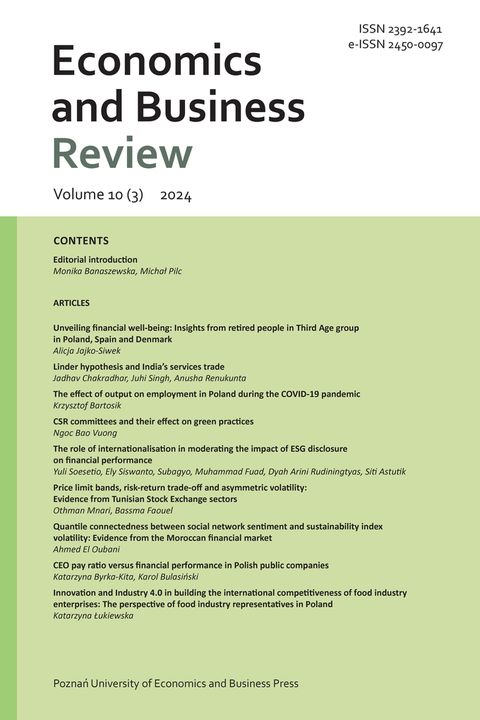
It is quite striking how many publications that seemed to make a contribution to the economics literature when printed become forgotten just a few years after that event. One may argue that this reflects the inability of economics to propose definite and precise laws governing people’s economic behaviour. However, it can also be hypothesised that the lack of such laws is caused by the constant evolution of the subject being studied, i.e., people’s economic activity. This is because that activity, in any given period, largely focuses on areas that a few decades or even a few years ago did not exist, or were of marginal importance. The current issue of Economics and Business Review supports this hypothesis, as it addresses the topics of ageing societies, the consequences of the COVID-19 pandemic, the export of services, Industry 4.0, and, predominantly, environmental responsibility. In other words, the set of nine articles that make up the current issue deals with topics that have only recently come to prominence in the economics literature. These nine articles, written by eighteen authors working in India, Indonesia, Japan, Morocco, Poland, and Tunisia, are briefly summarised below.

As the complexity of economic phenomena increases, so do the expectations placed on researchers in economics and finance. Research should not only be methodologically sound and contribute to the existing body of knowledge, but also provide guidance to stakeholders outside academia. The current issue of the Economics and Business Review addresses these needs, as the research findings can be useful to various groups, such as legislators, governmental bodies, financial advisors and investors. It contains seven papers by seventeen affiliated scholars from Poland, Slovakia and the USA. They use a variety of methodological approaches, both conceptual and empirical, to investigate key research questions in the fields of public economics, financial economics, labour economics and behavioural economics. (...) (Monika Banaszewska, Joanna Lizińska, Konrad Sobański)

It may seem that there is nothing special in the way people use money; they have been using it for many centuries. Yet recent technological changes, external shocks, growing welfare and also advancements in the field of economics have changed the way the financial markets behave and the way they are described. The current issue of Economics and Business Review reflects that trend, because it focuses heavily on financial topics. It consists of eight articles written by nineteen authors who work in Croatia, North Macedonia, Poland, Spain, the United Arab Emirates, the United Kingdom, the USA, and Vietnam. The authors use quantitative and qualitative methods to answer their research questions, which hopefully would be of interest not only to researchers but also to practitioners and policymakers (...) (Michał Pilc, Konrad Sobański).

Since the early beginnings of the economic sciences, investments have been considered as one of the key drivers of economic growth. In turn, the effectiveness and resilience of investments depend on a variety of factors and circumstances, including the stance of financial and labour markets, and access to energy sources. These considerations form the main theme of the current issue of Economics and Business Review. It consists of seven articles written by eleven economists from four countries (Poland, Slovakia, Turkey and the United Kingdom). The authors delve into macroeconomic and microeconomic issues, and use both theoretical and empirical methods to address the research questions. It is hoped that the research findings will have resonance beyond the academic community (...). (Monika Banaszewska)

This issue of Economics and Business Review answers the new set of challenges that the economic world faces nowadays. The authors of eleven papers have enriched the existing literature by sharing the results of their studies in three areas. First, the key elements of company growth and value are studied. The variety of development paths of entrepreneurship makes this area especially complex considering the sudden changes in the business environment over the last years. The second group of articles deals with quite new factors that give rise to new threats which are appearing but which also create enormous opportunities for economic decision makers. These are environmental issues, new technologies, integration between countries and social capital. The third research set addresses the current dilemmas of public authorities. The papers support answers to the questions about food security, local public debt, sustainability of public debt and the consequences of economic integration. (Joanna Lizińska, Michał Pilc, Konrad Sobański)

Digitalisation, big data, and artificial intelligence (AI) are the buzzwords of our time. During recent years the topic has attracted much attention which seems to have reached its climax at this moment. The number of publications went up from 20 publications annually in the 1990s and the first decade of our century to more than 1,000 in the 2020s. However, most of the articles in the media did not meet their scientific claims. Thus, the more the number of publications increased the more the questions to be answered increased leaving room for much speculation. Therefore, the editors decided that it is time for an intensive scientific analysis of the problems linked to the three buzzwords and their implications for economic theory, economics, and business. (Horst Brezinski, Witold Jurek)

Recent times have observed an extraordinarily large number of shocks that shape economic systems worldwide. Nevertheless, it does not mean that questions raised in economic debate decades or centuries ago have lost their relevance. Just the contrary, they deserve even a more intensive scholarly interest against the backdrop of circumstances such as digitalisation, slowbalisation followed by the reverse of globalisation and climate change. What are the incidence and welfare consequences of tariffs? Under which conditions does the economy converge to the balanced growth path? What are the effective measures to mitigate negative external effects? Are financial markets efficient? Can privacy be considered as an economic good? The five papers included in the current issue of Economics and Business Review offer original contributions to answering these vital questions. They were written by six authors affiliated in Poland and the USA. The articles employ a variety of research approaches spanning from theoretical modelling to empirical studies utilizing primary as well as secondary data. Apart from the scholarly audience the research results may be useful for policy makers and practitioners. (Monika Banaszewska)

The papers published in this issue apply various perspectives to advance the understanding of several pertinent issues in economics, business, and finance. The first two papers investigate data from many countries to gain new insights into capital markets and corporate finance. Three other papers focus on specific countries and through the application of robust methodologies and multiple measures strengthen the conclusions. The issue is concluded with a paper that takes a theoretical view on the issue of managing talented personnel which has changed substantially since the onset of the pandemic. (Paweł Niszczota, Ida Musiałkowska)

The current issue of Economics and Business Review includes six articles covering various current topics present in economic debate. They were written by eleven authors that work in Germany, Poland, Ukraine and Turkey. However, behind this variety of topics it can be seen that all these articles describe phenomena that either help to build trust (the rule of law, the institution of marriage) or to some extent rely on trust (financial development, policy effectiveness, migration). Thus it is hoped that these articles will inspire readers to consider the reasons, consequences and possible remedies for trust deterioration. Economics and Business Review could serve as an outlet of first choice to present the scientific results of these considerations. (Michał Pilc)

While the world is still dealing with the consequences of the COVID-19 pandemic it faces new political, social and economic challenges arising from the war at the interface between Europe and Asia—on the edge of the European Union. In such circumstances the functioning of economies, financial markets and businesses is significantly hampered and requires increased efforts by policymakers and market participants to forecast key processes now happening at an accelerated pace, evaluate their potential consequences and find ways to mitigate the associated risks. The current increase in volatility is a stark reminder of a number of fundamental questions that need to be constantly answered in new contexts: How can sudden shifts in financial markets be anticipated more effectively especially with the use of modern technologies? How to design investment portfolios in uncertain times? Can new, alterna-tive asset classes perform useful functions in this regard or are these assets more likely to cause market disturbances in the future? How to shape operations and corporate governance of businesses to avoid additional, unnecessary internal disruptions and costs? How to model and price market risk during a period of rapidly increasing inflation and interest rates? What is the impact of inevitably rising arms spending on the world economy and individual countries? Is military expenditure the only rational way to ensure regional and global security? How should regulators counter the negative effects of labour market uncertainty? Are the world and individual countries doomed to widening economic inequalities? What are the counter measures? The current issue of Economics and Business Review consists of seven papers and aims to provide answers to these fundamental questions in the context of ongoing trends in the economy, financial markets and businesses. It contains both theoretical and empirical contributionsby fifteen authors from Germany, Nigeria, Poland and Romania. (Konrad Sobański)

Strong and resilient economies can prove helpful in putting a stop to the atrocities of war. This lesson drawn from the past has attracted broader attention due to Russia’s unlawful invasion of Ukraine. The endeavour to protect human rights is not a sprint but a marathon so that one should not lose sight of longterm economic challenges and opportunities such as climate change and digitalisation. The evergreen question of the state’s role in the economy that regained prominence at the outburst of the COVID-19 pandemic has recently become equally or even more important. Five papers included in the current issue of the Economics and Business Review represent original contributions from academia to these fundamental discussions. (Monika Banaszewska)

It may have been noticed that the most recent events resemble at least some of the challenges experienced by humanity one hundred years ago. The small progress made by COP26 in tackling the climate crisis is reminiscent of the difficulties experienced in coordinating countries’ efforts to maintain world peace through the League of Nations. The next wave of the COVID-19 pandemic mirrors the returning infection of the Spanish flu while accelerating inflation is similar to the rapidly rising prices in some countries after the First World War. The initial reading of the table of contents of this Economics and Business Review issue may also give an impression that it covers topics that are reflections of economic history. The proposal for IMF reform discussed in this issue can be seen as a next step in the evolution of the idea of a “central bank” that goes back to the XVII century. (Michał Pilc, Konrad Sobański)

The coronavirus pandemic has blatantly reminded us that fluctuations are the unavoidable element of economic processes. This calls for even more intensified research into their nature and countermeasures. At the same time a critical reflection on economics’ theoretical foundations is much needed. The current issue of Economics and Business Review addresses these demands by presenting the results of studies conducted by eight scholars from five countries: Hungary, India, Japan, Poland and Turkey. The authors harnessed both theoretical and empirical approaches to explore their areas of interest. It is hoped that the contributions will assist and inspire scholars for further research as well as provide policymakers with useful guidance. (Monika Banaszewska)

Decision making in the area of economics is becoming ever more complex. This can be the result of a significant growth in the dynamism of processes observed in many private or public entities, as well as their environment. The diversity of topics of papers published in this issue of Economics and Business Review reflects the variety of problems faced in the process of making economic decisions. The research presented contributes to the literature on the validity of cognitive biases, decision making under certainty, the complexity of decisions in the healthcare and fiscal systems, financing decisions in the context of corporate social responsibility and small area estimation problems. The contributions are from ten researchers. They represent nine institutions located in four countries: Canada, Republic of South Africa, Nigeria, and Poland. (Joanna Lizińska, Paweł Niszczota)

The unexpected and dramatic events, such as pandemics, strongly focus the attention of economists, policymakers and public opinion on the short-term perspective. The challenges that face particular economies in the long-run almost instantly seem to be less important and discussions concerning these challenges are usually postponed to unspecified ‘better times’. Such an approach, even if justified, may occur to be socially damaging mainly because the problems of poverty, gender inequality or poor education will probably only be more acute after the COVID-19 pandemic. (Monika Banaszewska, Michał Pilc)

In the wake of new challenges such as income inequalities, populism, the rise of protectionism, climate change, the development of new technologies, demographic structure shifts and migration, the pandemic and its consequences countries and international organisations are looking for new solutions. The debates on prospective and post-liberal social and economic paradigms that would respond to these challenges have already begun worldwide. Latin America and the Caribbean (LAC) are the regions of the world characterised by the biggest persistent disparities. Therefore the new conditions of development combined with still unsolved problems create both threats and opportunities for policy-makers and chances for academics to contribute to the debate. Against this background the leading theme in this issue of the Economics and Business Review papers were invited that aimed to answer the following research questions from an economic perspective: 1. What is the current macroeconomic situation of countries or regional international organisations of which they are a member and what are the factors that influence the economic development? 2. What are the most important structural problems of the economy of the country, what are the policy successes and failures? What are the strengths and weaknesses of the institutional environment supporting developmental processes in Latin America and the Caribbean? 3. What is the condition of the financial sector and what are the possibilities of accessing capital in the countries of Latin America and the Caribbean? 4. What are the relationships between education, the labour market and the competitiveness of the economies? 5. What are the prospects for social cohesion and social inclusion in particular countries and organisations? (Ida Musiałkowska)

“Poverty has no causes, wealth has causes”—this statement, attributed to the development economist Peter Bauer (1915-2002), may serve as the title of a book on the entire history of growth theory since Adam Smith’s An inquiry into the nature and causes of the wealth of nations (Smith, 1776). Indeed to understand why the standard of living differs across people, countries and time we need to understand the causes of wealth. This is the topic of the current Economics and Business Review. With this issue the Review honours the outstanding contribution of Professor Oded Galor, Herbert H. Goldberger Professor of Economics at Brown University, to the field of growth theory. At the same time it celebrates the degree of doctor honoris causa that the Poznań University of Economics and Business conferred on him in 2019. (Andreas Irmen)
ISSN 2392-1641
e-ISSN 2450-0097
DOI: 10.18559/ebr
Impact Factor: 1.6
CiteScore 2024: 2.1
SJR 2024: 0.299
SNIP 2024: 0.438
JCI 2022: 0.27
MNiSW: 70
ABDC- JQL: C
Editorial Office: Economics and Business Review
Collegium Altum
ul. Powstańców Wielkopolskich 16, room 109
61-895 Poznań, Poland
secretary@ebr.edu.pl
Publisher&Owner: Poznań University of Economics and Business Press
al. Niepodległości 10
61-875 Poznań, Poland
https://wydawnictwo.ue.poznan.pl
Publisher's office: wydawnictwo@ue.poznan.pl
phone +48 61 854 31 54
